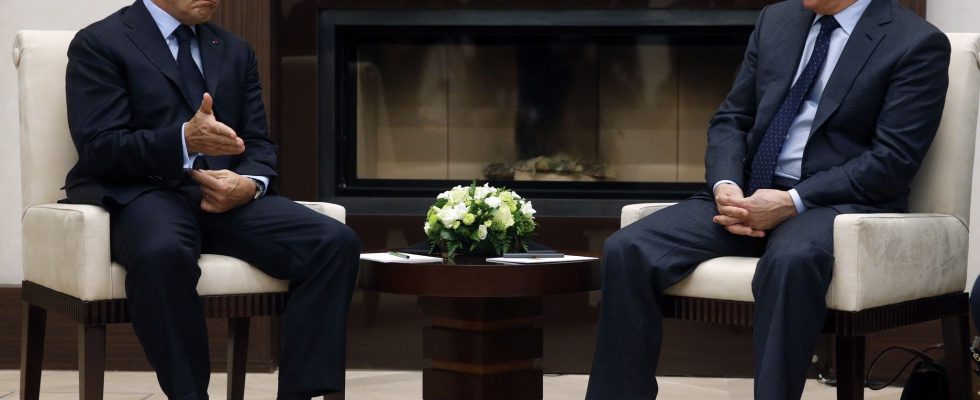In his recent interview in Le Figaro Magazineformer President Nicolas Sarkozy is proposing to bring Ukraine back to the de facto neutrality it had until February 24, 2022. The former head of state necessarily knows that any prospect of EU membership Ukraine in NATO had ceased to be topical since France, which he led, had – among others – successfully opposed it in 2008: it is this strategic void, together with the absence of any possibility of joining the European Union, which created the strategic conditions first of all for the annexation of Crimea in 2014 and then for the war of conquest launched in 2022. It will also be recalled that the fact of attaching this neutrality assurances of security, as Mr. Sarkozy does, does not change the case: these so-called assurances have existed since the Budapest memorandum signed in 1994 by the permanent members of the UN Security Council.
Stunned also to hear him speak of Ukraine as a bridge between Russia and Europe. Moscow has already proclaimed the attachment to Russia of one-sixth of the Ukrainian territory handed over to forced Russification under the atrocious conditions that the former president cannot ignore: this is more than the area of the Loire basin, the longest of our rivers.
It is not with this raw material that we build bridges in the real world.
As for the annexation of Crimea to which Mr. Sarkozy comes back, would he have forgotten that this coup was not recognized by any serious State, not even by China which wants to be Russia’s friend? The metaphor of the bridges joins here the true reality: a bridge was certainly built, in all illegality, between annexed Crimea and Russia. Funny “hyphen”, to use another formula of the ex-president.
But beyond the easy criticism of this type of enormity and others, it is more difficult to grasp their motivations: why does Mr. Sarkozy engage in this exercise, which we cannot simply explain as an aberration of mid-August in the heart of what the Brits call the ‘silly summer season’, supposedly populated by media ‘chestnut trees’?…
He acted as if he feared neither the opening nor the relaunch of new questions, possibly judicial, on his real or supposed links with Russia. Nor does he seem to worry about the inevitable recall of risky decisions taken during his five-year term, such as the sale to Russia of the excellent Mistral warships after the war in Georgia. His successor, François Hollande, had fortunately and not without difficulty, succeeded in preventing its delivery after the invasion of Crimea: this made it possible to prevent Russia from proceeding with the landing envisaged by it in Odessa in March 2022. Otherwise, France would have been seen as an accomplice in the economic and strategic strangulation of Ukraine.
The former president behaves at the same time as if he saw a political interest in finding himself on a line close to that which had been his competitor in the second round of the 2007 presidential elections, Mrs. Royal, and in taking up the complacent themes towards Putin from the extreme right and the extreme left. However, until further information, he is not a candidate for new elective functions in France or for any high international function at the head of the European Union or NATO. And it is not his words that will establish a hypothetical status of Sage.
These terrible connections in no way benefit his own political camp, which finds itself weighed down by an additional factor of division.
The affair is all the more curious in that its positions are incoherent with regard to the anti-Americanism which traditionally unites, and not always wrongly, part of French opinion. In fact, it is the Americans who are currently obstructing the implementation of a process for Ukraine’s accession to NATO. For its part, France, like many member countries of the European Union and the United Kingdom, would see it as a better guarantee of strategic stability than possible alternatives. Among these is the neutrality proposed by Mr. Sarkozy, with its illusory guarantees. There is also a scenario sometimes evoked by the White House in which Ukraine would be a kind of Israel promised to decades of confrontation. Added to this is a “Canada Dry” version of membership in NATO, represented by highly proclaimed national or European security guarantees which would lack nothing, except credibility, and that in the eyes of both Kiev and Moscow.
For the time being, it is France, the United Kingdom and perhaps soon Germany which are transferring cruise missiles to Ukraine to strike Russian forces in depth. It is not the Americans who deliver the equivalent of Scalp, Storm Shadow and other Taurus.
Also, the anti-American compass cannot serve as an explanatory guide here – unless Nicolas Sarkozy is still unaware of these recent realities, which have matured over the past few months in the light of the state of the situation in Ukraine.
Since the start of the war of conquest, opinion polls in France can be summed up over time by the formula “Zelensky 60% / Putin 9%”. In other words, the French on the whole keep a cooler head than some of their bad shepherds. Taught by their national history and their family memory, the French know how to tell the difference between a real invasion and a bridge without piles or deck.
The question of Sarkoz’s motivations thus remains unanswered. One would ultimately be tempted to see it as an act of pure political vandalism: I sow confusion, I divide my supporters, I align myself with the positions of the invader, so I exist?
